When it comes to embroidery, choosing the correct machine embroidery hoop sizes is one of the first steps to achieving a beautiful design. Different hoop sizes can greatly impact how well your fabric stays in place and how precise your stitching turns out.
Whether you’re working on a tiny, intricate design or a larger project, understanding the right hoop size is essential.
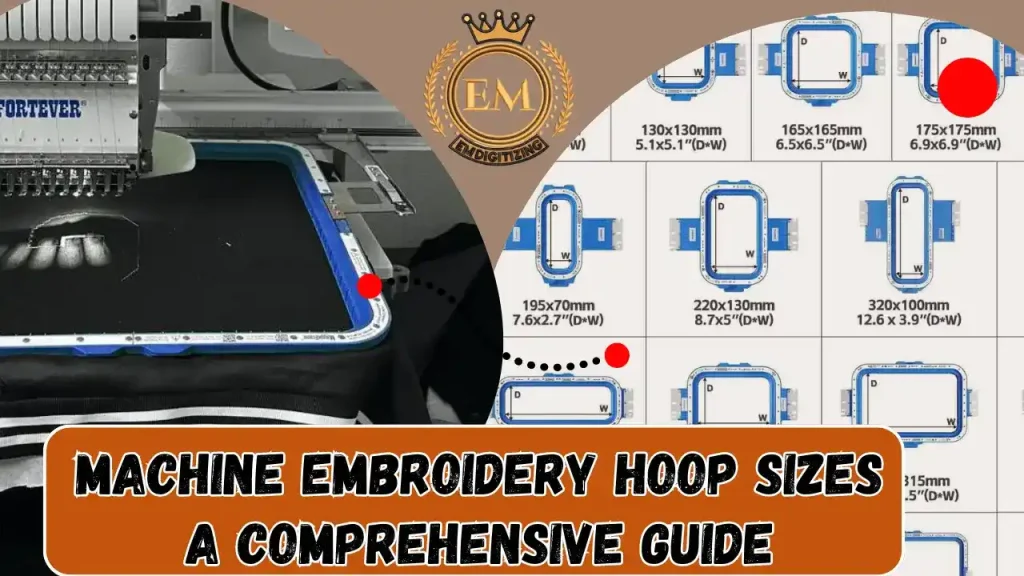
In this article, we’ll break down the various hoop sizes, what they’re best used for, and how to pick the perfect one for your next project.
Let’s simplify the process together!
Machine Embroidery Hoop Sizes: A Comprehensive Guide
Understanding Embroidery Hoops
An embroidery hoop is crucial in machine embroidery for holding the fabric steady under the rigorous movements of the embroidery machine. It consists of two parts: an inner ring and an outer ring. The fabric is placed between these rings and stretched taut, providing a smooth surface for the machine to embroider on. This setup helps prevent fabric puckering and ensures that the needle passes through the fabric at the correct points, which is essential for detailed and precise embroidery designs.
Significance of Choosing the Correct Hoop Size
The right hoop size is more than a convenience; it is a requirement for successful embroidery. An appropriately sized hoop will hold your fabric securely in place, allowing the embroidery machine to perform optimally.
Conversely, poorly chosen machine embroidery hoop sizes can lead to numerous issues such as fabric movement during the stitching process, which can result in misaligned stitches and a flawed final product.
Understanding hoop dynamics helps embroiderers avoid these pitfalls and achieve consistent, high-quality outcomes.
What are the Machine Embroidery Hoop Sizes Available?
Embroidery machine hoop sizes are generally classified by their diameter, which is specified in inches. The most prevalent sizes include:
- Small Hoops: Up to 4″x4″
- Medium Hoops: Sizes such as 5″x7″ and 6″x10″
- Large Hoops: 8″x8″, 8″x12″, and larger
1. Small Hoops
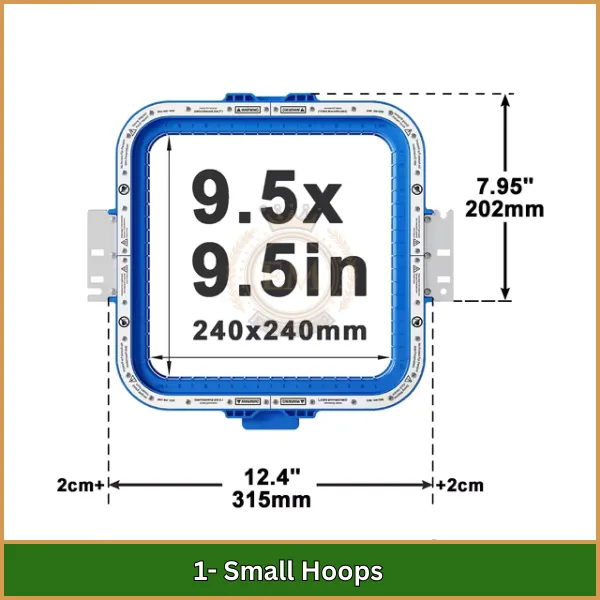
Small hoops are compact embroidery tools, typically measuring 4″x4″ or smaller. These hoops are ideal for detailed, small-scale projects where precision is crucial. They are easy to handle and maneuver, making them perfect for intricate designs on smaller pieces of fabric.
Applications
Small hoops are excellent for projects such as:
- Monogramming on personal items like handkerchiefs and baby clothes.
- Detailed embroidery on small sections of a project, such as a logo on a pocket or a small motif on a wristband.
- Crafting projects that require fine detail, including creating miniature embroidered art pieces for jewelry or decorative purposes.
Pros and Cons
Pros | Cons |
Easy to manage and ideal for detailed work | Limited to smaller design areas |
Lightweight and portable | May lead to hand fatigue with prolonged use |
Often more affordable compared to larger hoops | Not suitable for larger embroidery projects |
2. Medium Hoops
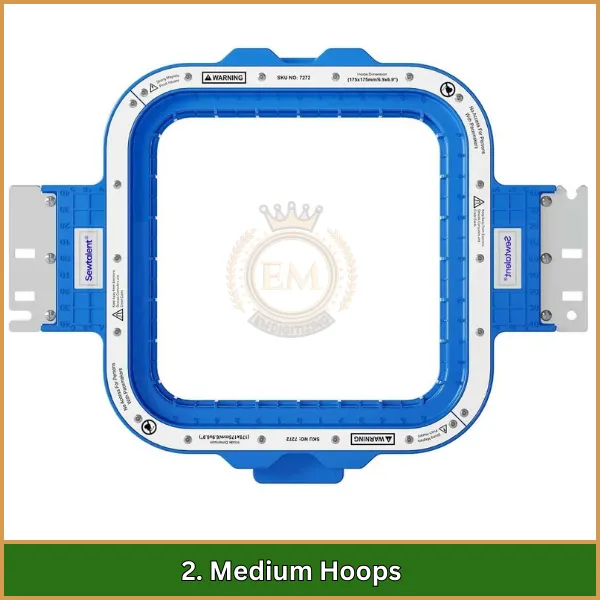
Medium hoops typically range in sizes such as 5″x7″ and 6″x10″. These hoops offer a balance between the compactness of small hoops and the expansive area of large hoops, making them versatile for a wide range of embroidery projects. They are large enough to accommodate more complex designs but still manageable enough for easy handling.
Applications
Medium hoops are well-suited for:
- Embellishing apparel items like T-shirts, towels, and medium-sized decorative pieces.
- Creating detailed patterns on home decor items such as cushion covers or table runners.
- Handling medium-scale production runs for custom embroidery businesses, where versatility in design size is required.
Pros and Cons
Pros | Cons |
Suitable for a broad range of embroidery projects | May not be suitable for very large or very small designs |
Provides better fabric tension than smaller hoops | Heavier and potentially more cumbersome than small hoops |
Allows for more detailed and larger designs than small hoops | More expensive than smaller hoops |
3. Large Hoops
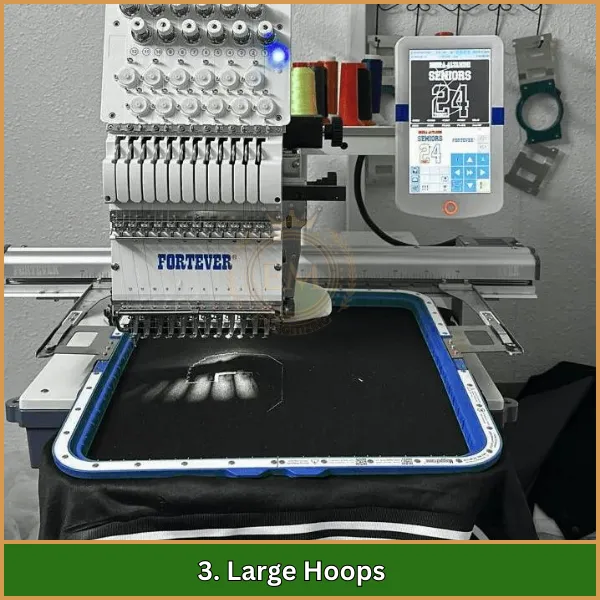
Biggest embroidery machine hoop size typically includes sizes like 8″x8″, 8″x12″, and larger. These hoops are essential for accommodating substantial embroidery projects that require extensive space. They are ideal for working on big pieces such as banners, quilts, and draperies, allowing for the creation of large-scale designs and patterns.
Applications
Large hoops are perfect for:
- Embroidering large textile pieces, such as quilts and bed linens.
- Creating wall hangings and other large decorative items.
- Managing extensive embroidery projects that benefit from a wide stitching area, enhancing creativity and design potential.
Pros and Cons
Pros | Cons |
Allows for large designs and intricate patterns | Can be heavy and cumbersome, especially for hand-stitching |
Provides better visibility and maneuverability for big projects | Generally more expensive than smaller hoops |
Suitable for professional and large-scale embroidery projects | Requires more storage space due to their size |
Understanding Pricing Variations in Hoop Sizes for Embroidery Machines
Pricing for machine embroidery hoop sizes can vary significantly based on several factors including size, material, brand, and additional features. Here’s a general breakdown of how pricing tends to vary across different hoop sizes and types:
Small Hoops
- Plastic Hoops: Prices typically range from $2 to $10 each. These are the most affordable options, ideal for small, detailed projects.
- Wooden Hoops: Generally cost between $5 and $15, offering a sturdier build that can provide better tension for fabric.
- Specialty Shapes and Features: Can range from $3 to $12, depending on the complexity and specific use of the hoop.
Medium Hoops
- Plastic Hoops: These are usually priced between $5 and $15. They offer a good balance between affordability and functionality for moderate-sized projects.
- Wooden Hoops: Cost between $10 and $25, known for their durability and better fabric support.
- Specialty Medium Hoops: These can vary widely in price from about $10 to $30, often designed for specific applications or enhanced with easy-adjust features.
Large Hoops
- Plastic Hoops: Typically start at around $15 and can go up to $30, suitable for larger embroidery projects.
- Wooden Hoops: Prices range from $20 to $50, preferred for their robust construction which is necessary for extensive embroidery tasks.
- Specialty Large Hoops: Can be quite costly, ranging from $25 to $60 or more, especially if they include features like a hoop stand or advanced tension mechanisms.
Guidelines for Selecting the Right Machine Embroidery Hoop Sizes
Selecting the right machine embroidery hoop size is essential for achieving high-quality results in your embroidery projects.
Here are some guidelines to help you choose the most suitable hoop size:
- Design Size
- Fabric Type
- Project Requirements
- Comfort and Ease of Use
- Machine Compatibility
- Project Duration and Frequency
- Future Project Considerations
1. Consider the Design Size
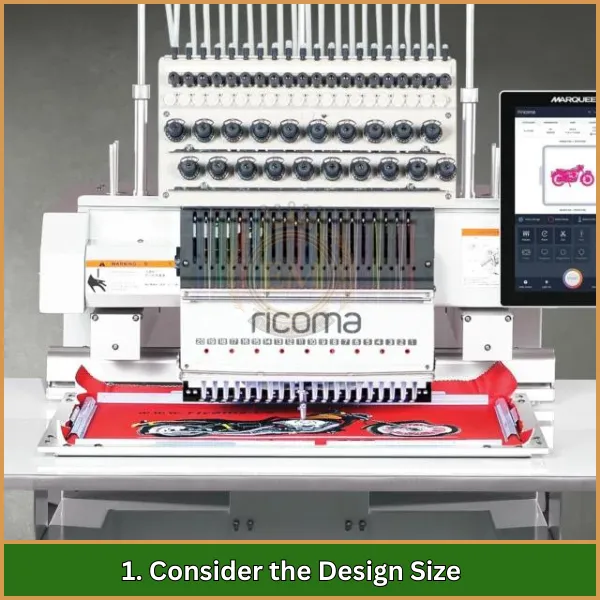
The size of the embroidery design you intend to stitch is the most critical factor. Always select a hoop that can comfortably accommodate your entire design with some margin around the edges.
If the hoop is too small, it will constrain the design and possibly cause fabric tension issues. Conversely, a hoop that is too large might make the fabric difficult to stabilize, leading to uneven stitching.
2. Assess the Fabric Type
Different types of fabric have different handling characteristics:
- Thick fabrics like denim or upholstery material may require sturdier hoops to hold them securely.
- Delicate fabrics like silk or chiffon need smaller, lighter hoops to prevent fabric damage from excessive tension.
3. Understand the Project Requirements
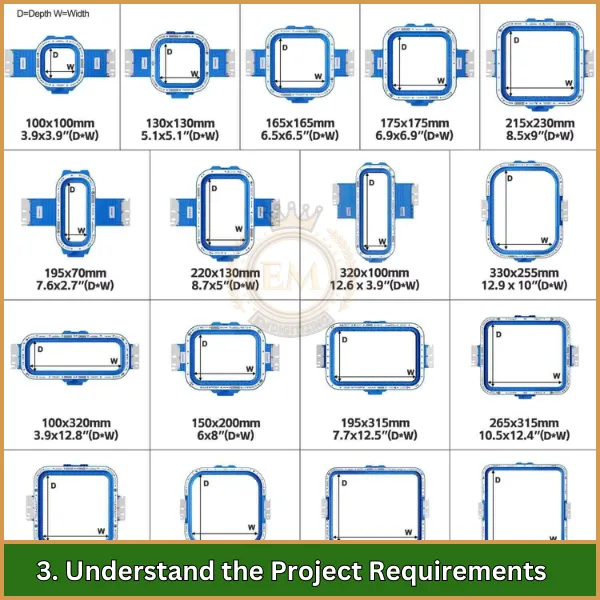
Consider the overall requirements of your project:
- Small items like badges or patches are best suited to small hoops.
- Medium-sized projects such as shirt logos or towel designs work well with medium hoops.
- Large projects like tablecloths or quilt blocks will need large hoops to handle the extensive fabric areas efficiently.
4. Evaluate Comfort and Ease of Use
Especially for larger or more complex projects, consider how the hoop size will affect your comfort during the embroidery process:
- Larger hoops may be heavy and cumbersome, potentially requiring a stand for machine embroidery.
- Smaller hoops are more manageable but may lead to hand fatigue if used for an extended period.
5. Check Machine Compatibility
Ensure that the hoop is compatible with your embroidery machine. Not all hoops fit all machines, so it’s important to check that the brand, model, and size of the hoop are suitable for your specific embroidery machine.
6. Project Duration and Frequency
If you frequently work on similar types of projects, choose a hoop that offers flexibility and durability:
- For frequent use, invest in high-quality hoops that withstand wear and tear.
- For occasional use, more basic models might suffice, provided they still meet your project’s needs.
7. Future Project Considerations
Think about whether you might expand into larger or more varied embroidery projects in the future. Investing in a range of hoop sizes from the outset can save time and ensure you are always prepared for any project.
Final Verdict
Mastering the right machine embroidery hoop sizes is key to getting flawless results on every project. The correct hoop helps keep your fabric in place, minimizes errors, and ensures each stitch is perfectly placed.
With this knowledge, you’re now better prepared to choose the ideal hoop for your designs.
When it comes to digitizing your embroidery designs, EMdigitizing is here to help. We pride ourselves on offering fast turnaround times, affordable pricing, and top-notch quality. And as a bonus, we’re offering 50% off for all first-time customers!
Let us take your embroidery to the next level with our professional digitizing services.
FAQs
For beginners, the best hoops are those made of bamboo or plastic with a brass adjustment screw, offering ease of use and stability for various projects.
To determine the right embroidery hoop size, choose one slightly larger than the design area to ensure the fabric remains taut and easy to work with.
The size of hoops you need depends on your project; commonly, a set including small (4 inches), medium (6 inches), and large (10 inches) diameters covers most projects.
To choose the right hoop, consider the material (bamboo, plastic, or metal for durability), the size relative to your project, and the hoop’s closure type for fabric tension control.
